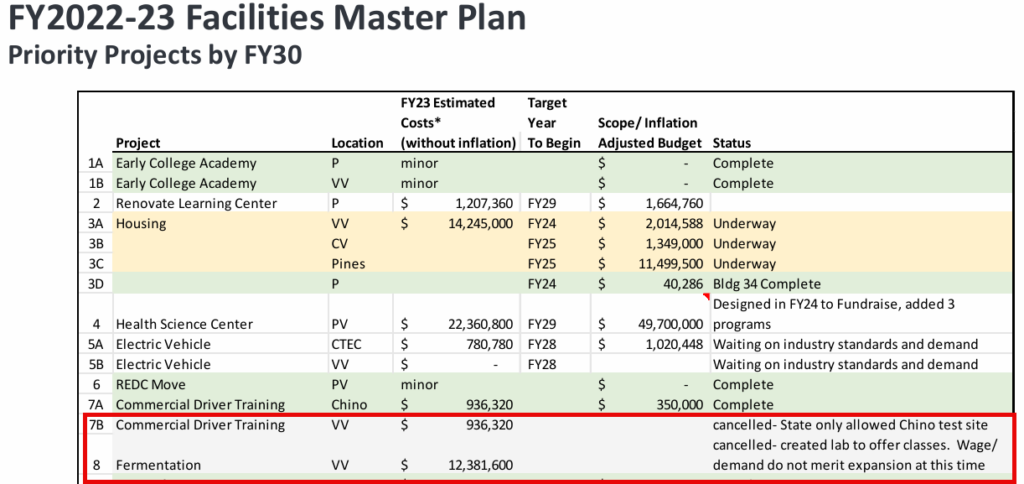Leadership says that the State of Arizona would allow it only a single driving facility. The leadership then turned its focus to the Chino Valley Center where major improvements on developing a facility have recently been completed.


Yavapai Community College President Dr. Lisa Rhine informed the District Governing Board at its March meeting that the College had been named on of USA Today’s “Top Workplaces.” In a March 26 news release, the College explained that “The ‘Top Workplaces’ award recognizes more than 1,500 organizations with 150 or more employees that have created exceptional, people-first cultures. About 40,000 organizations were invited to participate.”
Winners are recognized for their commitment to fostering a workplace environment that values employee listening and engagement. Yavapai College was cited as an outstanding workplace among institutions with 500-999 employees.”
Dr. Rhine, in commenting on the award, said: “It is an honor to be recognized as a top workplace in the U.S. Our employees are the engine that powers what we do, and it is incredibly important that we build a culture that supports them. I am so proud of YC.”
Top Workplaces are determined by administering an employee engagement survey through Energage. Energage surveys employees at thousands of companies worldwide. The employee survey feedback is the sole criterion in determining the Top Workplaces. A full list of 2025 winners can be seen at:
https://www.usatoday.com/story/money/2025/03/20/best-places-to-work-2025-survey/77718021007/
The “Top Workplaces of 2025” citation comes a year after Yavapai College was named one of 2024’s “Top Workplaces in Arizona” by AZCentral, USA Today Network, and LocalIQ.
The Yavapai Community College Governing Board unexpectedly rescheduled its zoom meeting set for March 25 to March 26. The change occurred when Board member William Kiel informed the Board’s lawyer on the morning of March 25 that the electronic link to the Board agenda had not been activated on the Board’s website. Because the link was not properly activated, members of the public were unable to access the agenda at least 24 hours before the meeting, as required by law.
Arizona law mandates that Board agendas be made publicly available at least 24 hours prior to a meeting. However, the Board’s lawyer believed that the March 25 meeting could have proceeded despite the web notification failure because paper copies of the time, place, and summary agenda were properly posted elsewhere. However, she advised the Board to reschedule the meeting to ensure that the public, particularly those relying on the website link, had an opportunity to review the agenda and the topics to be discussed at least 24 hours before the event.
The written explanation offered by the Board lawyer is set out below:
“The Governing Board’s legal counsel learned late on the morning of March 25, 2025 that the link on the College’s website to the District Governing Board’s March 25 meeting agenda was inadvertently not activated until the morning of March 25. The agenda was posted more than 24 hours in advance, but the link was not made “live” at the time. Therefore, members of the public attempting to access the meeting agenda from the College’s website could not do so at least 24 hours in advance.
“The College physically posted the meeting agenda more than 24 hours in advance of the March 25 , 2025 meeting.
“The Open Meeting Law allows a governing board to proceed with a public meeting if a ‘technological problem or failure’ prevents the posting of the agenda on the website 24 hours in advance, as long as the agenda was physically posted in compliance with the Open Meeting Law. Although the March 25 District Governing Board meeting could therefore proceed despite the technological agenda posting issue, the Board has been advised to reschedule the meeting to ensure that the public receives adequate notice of the meeting.”
The Yavapai Community College District Governing Board will hold a meeting on Tuesday, March 25, via Zoom and available on YouTube. The meeting was originally scheduled to take place at the Verde Campus in Clarkdale. However, Board Chair Deb McCasland abruptly changed the meeting format several weeks ago to a virtual Zoom meeting, informing the Board in part that “after learning of safety concerns related to our board meetings,” she “decided that governing board meetings will be held virtually until further notice.”
The alleged “safety concerns,” remain a complete mystery, as McCasland has steadfastly refused to disclose any details to Governing Board members or the public.
The public has seen no signs of any credible threat—no incidents, no warnings, and nothing to suggest that an in-person meeting would pose any risk beyond the ordinary. The absence of a clear explanation has only deepened skepticism, raising questions about whether these so-called safety concerns are legitimate.
The meeting is scheduled to begin at 1 p.m. and is expected to conclude by 4 p.m. A live stream will likely be available on YouTube.
 The Phoenix Business Journal ran a story in its March 3 edition, written by Maricopa Community Colleges, promoting Scottsdale Community College’s newly created Bachelor of Business Administration in Management (BBA) degree. The article emphasized the program’s flexibility, offering both in-person and online classes.
The Phoenix Business Journal ran a story in its March 3 edition, written by Maricopa Community Colleges, promoting Scottsdale Community College’s newly created Bachelor of Business Administration in Management (BBA) degree. The article emphasized the program’s flexibility, offering both in-person and online classes.
It cited a report by the Georgetown University Center on Education and the Workforce, which projects that the number of new jobs in Arizona requiring postsecondary education and training will grow by 372,000 between 2021 and 2031. The report also stated that by 2031, 39% of all jobs in the state will require a bachelor’s degree, highlighting the increasing demand for highly skilled business professionals.
The Scottsdale program appears to compete with Yavapai Community College’s Bachelor of Science in Business degree. Unlike SCC’s in-person and online options, Yavapai’s program is entirely online. It offers flexibility by allowing students to enroll on a full-time or part-time basis.
You may read the full article by posting the following link in your browser: https://www.bizjournals.com/phoenix/news/2025/03/03/scottsdale-community-college-bachelor-business.html
Yavapai Community College Associate Dean for Education Heather Mulcaire is featured in the February/March issues of Prescott Woman Magazine. You may read the article authored by Michael Grady by following this link: https://publuu.com/flip-book/785991/1738411/page/34
Mulcaire discusses her work at the Community College, her family, and history in the Verde Valley. The article is well worth reading.
OPINION:According to data obtained from Yavapai Community College, the institution has spent over $2 million in consulting fees with SmithGroup, Inc. over the past three years. SmithGroup has been advising the college on capital development projects throughout the district.
Records indicate that the college paid SmithGroup consulting fees of $364,907 in 2022, $399,738 in 2023, and $1,312,938 in 2024.
In its 2022 master plan, SmithGroup recommended a development strategy for the Verde Campus, which the Governing Board conceptually approved. The plan outlined approximately $20 million in proposed projects, including $9.25 million for student housing, $608,000 for a commercial driver training program, $8.04 million for expanding the fermentation program with craft brewing and distilling, $3.09 million for renovations to Building “M,” and $146,000 for acoustic upgrades to rooms at the Sedona Center.
However, several projects outlined in the plan for the Verde Campus have since been abandoned, including major student housing, the commercial driver training program, and the fermentation and distilling expansion. Additionally, an electric vehicle (EV) project proposed in 2022 as a possibility for the Verde Campus has also been scrapped.
Given these outcomes, Verde Valley residents may reasonably question whether local taxpayers should be footing the bill for much, if any, of the $2 million spent on consulting. Or does the responsibility for the lack of development and refusal to follow the recommendations lie entirely with the controlling west side voting bloc on the District Governing Board?
 OPINION: In a perplexing display of opacity, the chairperson of Yavapai Community College’s District Governing Board, Ms. Deb McCasland, has repeatedly insisted that unspecified “safety concerns” prevent the Community College’s District Governing Board from holding in-person public meetings. (For example, in-person public meeting on the Verde Campus once scheduled for this month.) Yet, despite weeks passing since announcing there were “safety concerns,” she refuses to elaborate on what these concerns entail or provide any evidence to substantiate them.
OPINION: In a perplexing display of opacity, the chairperson of Yavapai Community College’s District Governing Board, Ms. Deb McCasland, has repeatedly insisted that unspecified “safety concerns” prevent the Community College’s District Governing Board from holding in-person public meetings. (For example, in-person public meeting on the Verde Campus once scheduled for this month.) Yet, despite weeks passing since announcing there were “safety concerns,” she refuses to elaborate on what these concerns entail or provide any evidence to substantiate them.
Meanwhile, the public sees no signs of any credible threat—no incidents, no warnings, and nothing to suggest that an in-person meeting would pose any risk beyond the ordinary. The absence of a clear explanation has only deepened skepticism, raising questions about whether these so-called safety concerns are legitimate.
This refusal to engage in transparency has left many wondering whether the claim of safety is merely a convenient pretext to control meetings. By relying on Zoom, the chair can dictate the flow of discussion with a click of a button—muting dissent, cutting off Board members she does not favor, and silencing the public at will.
Moreover, instead of promoting open dialogue and accountability, this approach suggests that the Board’s leadership is more focused on controlling the narrative than fulfilling its responsibility to the community it was elected to serve.
Yavapai Community College’s Prescott Campus will hold its semi-annual community food distribution drive-through only on March 28 from 10:00 a.m. to 1:00 p.m. or until all food is distributed. As noted, it is a drive through only event and is open to the public.
“If you need food, come and get food. We will load you up,” said YCC Student Affairs Coordinator Deborah Chambers.
Yavapai Community College, in collaboration with St. Mary’s Food Bank, is facilitating this food distribution initiative. According to the College, more than one in seven Yavapai County residents experience food insecurity or lack consistent access to sufficient nutrition for themselves and their families.
The blog has no information regarding a similar food distribution effort at the Sedona Center or the Verde Campus. Notably, programs like this not only address food insecurity but also enhance the Community College’s public visibility and reinforce its role as an active participant in the community. Hopefully, if it has not already preparing to do so, the College leadership will consider expanding such efforts to all campuses and centers as this would further demonstrate a commitment to serving the broader Yavapai County region.

 Arlyssa D. Becenti, writing in the Wednesday, March 12 edition of the Arizona Republic, reported that the Native American Convocation scheduled for May was cancelled at Mesa Community College (MCC) because of the perceived DEI mandate issued by President Donald Trump. The event was to be a celebration of the academic achievements of Native American students attending Mesa Community College.
Arlyssa D. Becenti, writing in the Wednesday, March 12 edition of the Arizona Republic, reported that the Native American Convocation scheduled for May was cancelled at Mesa Community College (MCC) because of the perceived DEI mandate issued by President Donald Trump. The event was to be a celebration of the academic achievements of Native American students attending Mesa Community College.
According to the article, Native American students from MCC and the nine other Maricopa County community colleges “received troubling news.” Due to actions by President Donald Trump, their Native American Convocation would be canceled. Additionally, Native American clubs, likely including MCC’s Inter-Tribal Student Organization and others, would be dissolved.
“I am incredibly disappointed to learn that the 2025 Maricopa County Community College District’s American Indian Convocation has been canceled,” Gila River Indian Community Governor Stephen Roe Lewis said in a news release. “This decision concerns me deeply, because it shows fundamental misunderstanding of the federal-tribal relationship which is based on political, not racial status. Today I am calling on MCCCD to immediately correct this error in interpreting the federal Executive Order and to allow the convocation to proceed.”
Maricopa Community Colleges have traditionally held a smaller ceremony to honor Native American students from all 10 community colleges in the Maricopa Community Colleges District. This year, that ceremony, along with similar convocations for other diverse student groups, has been canceled.
Neither Maricopa Community Colleges nor the county community college district responded to The Arizona Republic’s request for comment.
The issue of racial and political classification among Native Americans gained attention after Trump’s Education Department issued a memo on February 14. The memo claimed that Supreme Court decisions prohibit treating students differently based on race to achieve goals like diversity, racial balancing, social justice, or equity. This raised concerns among Navajo leaders and their attorneys.
“The letter doesn’t mention federal funds that are provided to Indian tribes and tribal organizations are not based on race,” said Chris Schneider, principal attorney for the Navajo Department of Justice. “It’s longstanding, its federal case law, you have Morton v. Mancari, which is a United States Supreme Court case … that determine that Indian isn’t always per se going to be a classification according to race. Instead, based upon the history of the United States and Indian tribes, it’s more political classification.”
Many legal experts believe the Trump administration ignores legality, precedent, the Constitution, and tribal treaties. Mel Wilson of the National Association of Social Workers notes this follows the vision of Project 2025. The dismantling of DEI efforts marks a dramatic shift, as colleges and institutions that once honored First Peoples with land acknowledgments have abruptly stopped doing so.